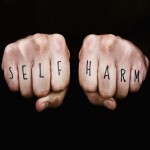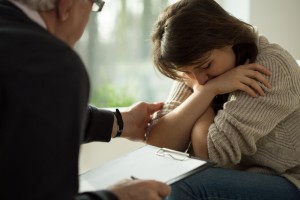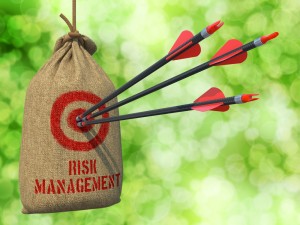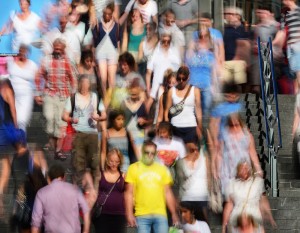
Self-harm is an umbrella term for a range of ways in which individuals can intentionally hurt themselves. People self-harm for a variety of reasons; it may be in response to a specific incident or situation, or it may become part of how someone tries to deal with on-going problems.
NICE has guidance on both the short-term and longer-term management of self-harm, which recommend that psychosocial interventions (that are specific to self-harm and tailored to the individual) be offered to people who have self-harmed.
A recent study was undertaken by researchers based in Denmark to see whether receiving psychosocial therapy after self-harm reduced people’s risk of repeated self-harm, suicide and general mortality (Erlangsen et al, 2014).
Methods
This cohort study matched 5,678 people who had self-harmed and subsequently received psychosocial therapy, with 17,034 people who had self-harmed but did not receive psychosocial therapy (standard care).
Psychosocial therapy varied across the different clinics and interventions were tailored to suit individuals’ needs, but the overall focus was on suicide prevention delivered over eight to 10 outpatient sessions. Standard care was admission to a psychiatric hospital, referral to outpatient treatment or general practitioner, or discharge with no referral. Where individuals did not receive psychosocial therapy it was usually because such services were not available or because they were referred to an alternative treatment.
The study used data from medical records at seven suicide prevention clinics across Denmark between 1992 and 2010.
Individuals were matched based on several demographic factors such as sex, age, level of education, experience of foster care, psychological diagnoses and family history of suicidal behaviour.
The outcomes measured were repeated self-harm, death by suicide and death by any cause.

This ecological study included a wide variety of different brief (8-10 sessions) psychosocial therapies.
Results
- Repeated self-harm was reduced in those participants who received psychosocial therapy at the 20 year follow-up (OR 0.84; 95% CI 0.77 to 0.91) and was consistently lower over the follow-up period.
- Death by suicide was significantly lower at five, 10 and 20 years, but the difference at one year was not statistically significant (p=0.1531).
- Death by any cause within a year was significantly lower over the 20 year follow-up (p=0.0006 in year one, p=<0.0001 for years five, 10 and 20).
- Subanalyses revealed that psychosocial therapy was more effective at reducing future self-harm and death by suicide in women than men, and more effective in adolescents (10-24 years old).
- Over the twenty year follow-up period, researchers calculated that the psychosocial intervention prevented 145 incidents of deliberate self-harm, 30 deaths by suicide and 153 deaths by any cause.

Psychosocial therapies were associated with a lower risk of future deliberate self-harm and death by any cause.
Conclusions
The authors concluded:
Our findings show a lower risk of repeated deliberate self-harm and general mortality in recipients of psychosocial therapy after short-term and long-term follow-up, and a protective effect for suicide after long-term follow-up, which favour the use of psychosocial therapy interventions after deliberate self-harm.

The treatment effects seemed more pronounced in women, young people and first attempters of suicide.
Summary
This cohort study shows that psychosocial therapy is effective in reducing repeated self-harm, death by suicide and death by any cause in the short-term (one year) and over the longer-term (20 years) in people who have self-harmed. The study is useful in demonstrating the overall effectiveness of psychosocial therapy in a large sample.
However, the psychosocial therapy delivered by the clinics varied, so it is not possible to specify what type of therapy is most beneficial, which the authors acknowledge as a limitation of their study.
There is general consensus that psychosocial therapy is effective in people who self-harm, there is still uncertainty about what type of therapy to offer (e.g. brief interventions) and about which elements of therapy are most effective. Therefore it would be helpful if future research could focus on identifying those “active ingredients” for effective psychosocial therapy in people who have self-harmed.

The panoply of included therapies in this study make it extremely difficult to identify the “active ingredient” that is helping people.
If you need help
If you need help and support now and you live in the UK or the Republic of Ireland, please call the Samaritans on 116 123.
If you live elsewhere, we recommend finding a local Crisis Centre on the IASP website.
We also highly recommend that you visit the Connecting with People: Staying Safe resource.
Links
Primary paper
Erlangsen A, Lind BD, Stuart EA, et al. Short-term and long-term effects of psychosocial therapy for people after deliberate self-harm: a register-based, nationwide multicentre study using propensity score matching. Lancet Psychiatry 2014; published online Nov 20. http//:dx.doi. org/10.1016/S2215-0366(14)70377-3 [Abstract]
Other references
NHS Choices. Self-harm. July 2013. http://www.nhs.uk/conditions/Self-injury/Pages/Introduction.aspx
NICE. Self-harm: The short-term physical and psychological management and secondary prevention of self-harm in primary and secondary care. 2004. https://www.nice.org.uk/guidance/cg16
NICE. Self-harm: longer-term management. 2011. http://www.nice.org.uk/guidance/cg133
For help and support see Samaritans: http://www.samaritans.org/ or call on 08457 90 90 90

RT @Mental_Elf: Psychosocial therapy effective in reducing self-harm, suicide and all-cause death http://t.co/Xo3lFkJGXf
Psychosocial therapy effective in reducing self-harm, suicide and all-cause death https://t.co/Je6W1VG5z2
Psychosocial therapy effective in reducing self-harm, suicide and all-cause death: Elly O’Brien summarises a l… http://t.co/Luv8aQm4ZJ
Psychosocial therapy for self-harm, suicide and all-cause death. Very powerful study #selfharm #youngmentalhealth http://t.co/tO2VQbBnqc
Paula Hughes liked this on Facebook.
Andrew Philip Holden liked this on Facebook.
Raluca Lucacel liked this on Facebook.
Psychosocial therapy effective in reducing self-harm, suicide and all-cause… http://t.co/4OsfGqMgoB #MentalHealth http://t.co/gyk3FCFF1y
Lisa Eden liked this on Facebook.
Today @ellyob on cohort study of short & long-term effects of psychosocial therapy for ppl after deliberate self-harm http://t.co/Xo3lFl1ilP
Alice Tomasevic liked this on Facebook.
Christina Armstrong-Graham liked this on Facebook.
Stephen Woodward liked this on Facebook.
Susan Ball liked this on Facebook.
Brian J Nuth liked this on Facebook.
RT @Mental_Elf: Large @LancetPsych study shows psychosocial therapy effective in reducing self-harm, suicide & all-cause deaths http://t.co…
#Psychosocial therapy effective in reducing #selfharm #suicide & death http://t.co/KMnabQ7f0e #evidence from a #cohortstudy via @Mental_Elf
Bethan Davies liked this on Facebook.
Sarah Kelly liked this on Facebook.
Does this establish that psychosocial therapy is effective in self-harm? http://t.co/Xo3lFl1ilP From now on should we focus on how it works?
Psychosocial therapy effective in reducing self-harm, suicide and all-cause death https://t.co/l8SA9q5e6O
RT @Private_Therapy: #Psychosocial #therapy effective in reducing self-harm, #suicide and all-cause death via @Mental_Elf http://t.co/xRztY…
Zoie Waddingham liked this on Facebook.
Jo Pool liked this on Facebook.
Lynnzie Stirling liked this on Facebook.
Victoria Day liked this on Facebook.
Gemma Louise Gibson liked this on Facebook.
June Dunnett liked this on Facebook.
RT @Mental_Elf: Don’t miss: Psychosocial therapy effective in reducing self-harm, suicide and all-cause death http://t.co/Xo3lFl1ilP #EBP
Psychosociale therapie effectief bij #zelfbeschadiging en #suïcidaliteit via @Mental_Elf http://t.co/y2vJwDpoEa
RT @Mental_Elf: Psychosocial therapy effective in reducing self-harm, suicide & all-cause death, but exact mechanisms remain unclear http:/…
Mental Elf: Psychosocial therapy effective in reducing self-harm, suicide and all-cause death http://t.co/WKD6KLkoH0
Scott Inglis liked this on Facebook.
Tullula Muscart liked this on Facebook.
Nadine Dougall liked this on Facebook.
Sarah Rai Leyton liked this on Facebook.
“Psychosocial therapy effective in reducing self-harm, suicide and all-cause death” http://t.co/STqcgg8MMW
@Mental_Elf co-occurring substance use is also a factor on this issue as another Elf pointed out –
http://t.co/NURgcdQUQY
Art Therapy Study liked this on Facebook.
Psychosocial therapy for self-harm, suicide #rvsed http://t.co/iQTQ40Ym67
I think it’s important to acknowledge the substantial research that has been conducted that substantiates the fact that self harm, suicide, and bpd are all highly correlated with sexual abuse histories and childhood trauma (see: van der Kolk, Herman et. al) This is not mentioned in the article. Also, the notion that self harm and suicide rates can be sufficiently addressed by short term therapeutic intervention (8 to 10 sessions) is absurd given the etiology of self harm. The desire for a ‘quick fix’ and economic incentive will always be there given the nature of managed care. Psychotherapy can be of some help, but this is not the ideal form of treatment. People with trauma histories need to learn to work with their bodies, learn relaxation skills and the ability to self regulate. This requires specific kinds of intervention and therapy not made readily available and accessible to most people. This is often viewed as ‘alternative’ because it is not mainstream, but not because it is ineffective treatment, rather it is inaccessible treatment often not reimbursable by insurance. Still, it also stands to reason that some form of psychotherapy would be better than none. A therapeutic alliance can serve as a “lifeline” to those who would otherwise have no other form of human connection or support.
[…] Les mer hos The Mental Elf […]
Psychosocial therapy effective in reducing self-harm, suicide and all-cause death https://t.co/dxM1wALEpp #psychosocialtherapy #selfharm #MH